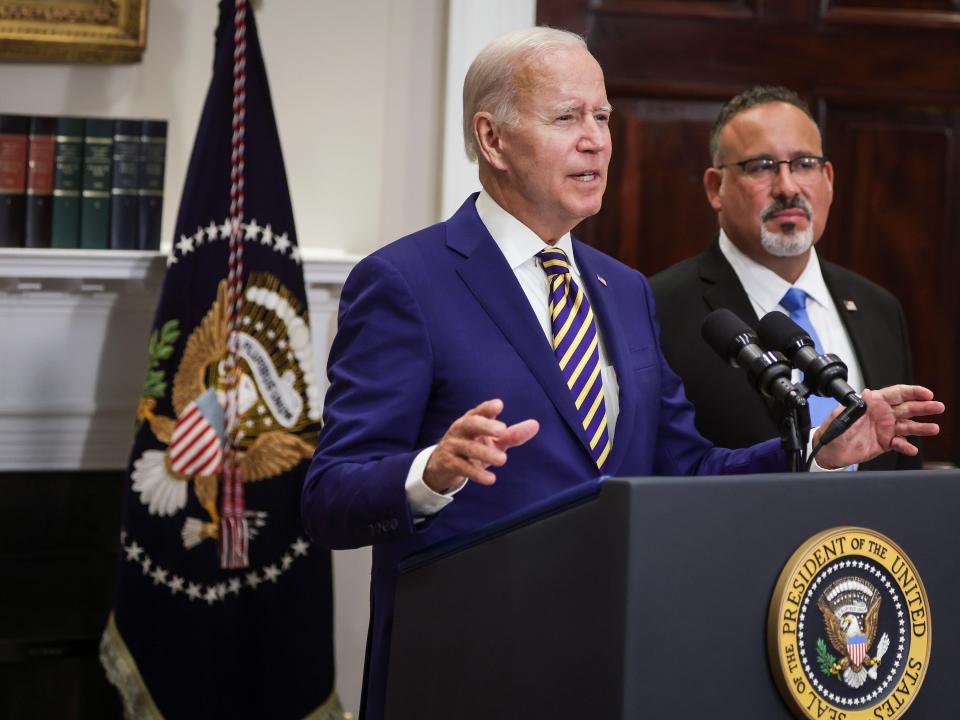Biden's Education Department blasts the GOP's new plan to strike down student-loan forgiveness, saying it's a 'shame' for the borrowers who live in their districts

Republicans introduced a resolution to overturn Biden's student-debt relief on Monday.
Education Sec. Cardona said it's a "shame" for the millions of borrowers who would benefit in the GOP lawmakers' districts.
The resolution faces a tough road ahead, requiring passage through both chambers and Biden's signature.
President Joe Biden's administration wants to be sure millions of student-loan borrowers know that some of their representatives are trying to block them from getting student-loan forgiveness.
On Monday, 37 Republican senators, led by Bill Cassidy, John Cornyn, and Joni Ernst, introduced a resolution to overturn Biden's plan to cancel up to $20,000 in student debt — and end the student-loan payment pause — using the Congressional Review Act (CRA), a congressional oversight tool.
The CRA allows Congress to overturn rules put in place by a federal agency, like student-debt relief, and it differs from regular legislation in that it allows senators to fast-track the bill by avoiding filibusters and new amendments, getting it quickly to a vote.
"President Biden is not forgiving debt, he is shifting the burden of student loans off of the borrowers who willingly took on their debt and placing it onto those who chose to not go to college or already fulfilled their commitment to pay off their loans," Cassidy said in a statement.
But Education Secretary Miguel Cardona disagrees. After the Republicans introduced the resolution, Cardona said in a statement that those lawmakers "represent millions of borrowers who have applied for student debt relief."
"It's a shame for these borrowers—the overwhelming majority of whom make less than $75,000 a year—and their families that their representatives are working so hard to deny them critical relief," Cardona said. "Instead of working to support hardworking students and borrowers, Republicans in Congress would rather give trillions of dollars in tax breaks to the super wealthy and the biggest corporations."
Biden's plan to cancel student debt has been paused since November due to two conservative-backed lawsuits seeking to permanently block the relief. The Supreme Court heard oral arguments in the cases in February and is expected to issue a final decision by June, and until then, millions of borrowers are waiting to see if they will have to resume payments this year with or without a reduction to their balances.
Still, Republican lawmakers don't want to wait for the Supreme Court decision. GOP Rep. Bob Good is expected to introduce the House version of the CRA this week, and the resolution could come to a floor vote soon after. To be sure, the resolution needs to pass through both chambers of Congress and get Biden's signature, so it's unlikely to succeed, but it could earn some Democratic support.
Democratic Sen. Catherine Cortez Masto, for example, told The Washington Examiner that she'll "review the full text of the CRA when it is released, but like I said before, I disagree with President Biden's executive action on student loans because it doesn't address the root problems that make college unaffordable." And Sen. Joe Manchin, a centrist Democrat, previously called the debt relief "excessive."
The White House continues to hold confidence that its debt relief plan will prevail, and Press Secretary Karine-Jean Pierre stressed the importance of the relief, and called out the millions of borrowers that would benefit from it, in a Monday press briefing.
"While Republicans in Congress are pushing for tax breaks for ultra wealthy and large corporations, they're also introducing measures to deny millions of their own middle class constituents from getting the student debt relief they need and deserve," Jean-Pierre said. "We're talking about more than 2.1 million borrowers who have applied for student debt relief in Texas, more than 380,000 borrowers in Louisiana, more than 250,000 borrowers in Iowa."
"These are hardworking borrowers who, for the most part, make less than $75,000 a year," she continued. "They're asking for a little extra breathing room as they prepare for loan payments to restart. And how are their Republican elected officials responding? They're bent on denying middle class families the relief they need."
Read the original article on Business Insider

